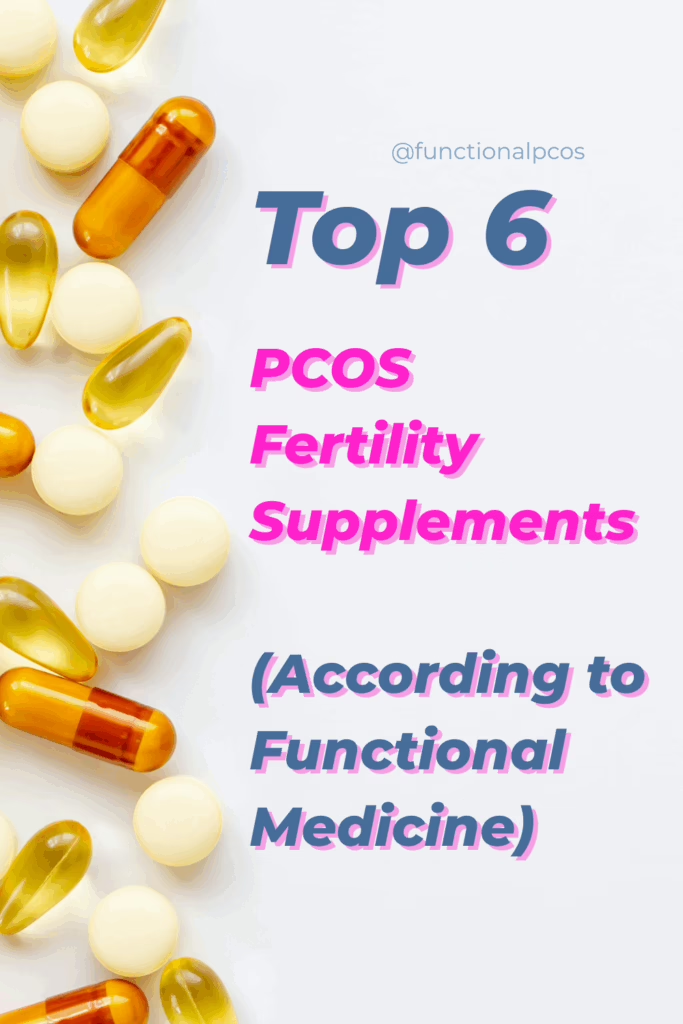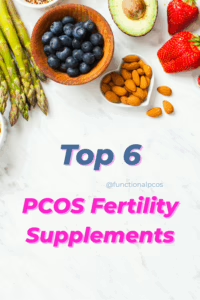 What are the best pcos fertility supplements?
What are the best pcos fertility supplements?
If you’ve been trying to conceive with PCOS, you’ve probably wondered: Do PCOS fertility supplements really work? The short answer is yes: they can help but they’re not a magic solution.
PCOS is a complex metabolic and hormonal condition that affects ovulation, egg quality, and overall fertility. Underlying issues like insulin resistance, chronic inflammation, adrenal imbalances, and nutrient deficiencies can all impact your chances of getting pregnant.
In general, it’s best to work on your underlying health alongside your fertility health with PCOS. I have some great advice about how to eat for fertility in PCOS, how to plan a diet for PCOS like a nutritionist would, and even an article on the best supplements for your PCOS root causes. All of these things can help you conceive!
But in this article, I’ll give you the pcos fertility supplements that I have personally used with clients in my work that has resulted in the births of many, many miracle babies (including my own!)
You can listen to my personal pcos success story here.
Is egg quality poor in PCOS?
Infertility in PCOS is a multifactorial issue. The reasons we struggle to conceive may seem on the surface to have little to do with egg quality. These are issues like irregular or absent ovulation: we can ovulate but it’s tough to catch it and there’s fewer opportunities to conceive because there’s simply fewer chances.
These irregular ovulations lead to irregular periods, which can result in imbalanced levels of estrogen and progesterone, both necessary for a healthy uterine lining.
But egg quality can also be an issue in PCOS and even if we can ovulate and catch that ovulation on time, we may still struggle to maintain a pregnancy.
Early miscarriage is far more common in PCOS than the population at large. This is due partially to imbalanced blood sugar and insulin levels and inflammation, but also may be due to poorer than average egg quality.
Why do we have poor egg quality in PCOS?
At its core, the body prioritizes one rule: survival over fertility.
In PCOS, our metabolic issues like insulin resistance and chronic inflammation put our body under stress. A stressed body tends to release extra hormones like cortisol that are great for giving you the energy you need to run for safety or fight for your life, but are more than we need for the stresses of modern life. Here’s an article I wrote on the top signs of high cortisol, see if this sounds like you!
So let’s imagine your body is under stress from the blood sugar issues and insulin issues at the heart of PCOS. The hormonal changes that occur because of these factors has already made it difficult to ovulate, and now the body has limited resources that need to go towards your own health. Most of the body’s energy is taken up keeping your blood sugar balanced and trying to manage the inflammation, so it doesn’t have a lot of energy left to put into egg development.
During the process of egg development (which actually takes about four months to six months before ovulation) the egg is exposed to those same imbalances and damaging inflammation, causing damage to the quality of the egg that the body sometimes doesn’t have the resources to fix.
I talked a great deal about this in my fertility and the mitochondria podcast episode with Dr. Kalea Wattles.
PCOS fertility supplements aim to bridge that gap and give the body those resources it needs. I generally recommend starting these at least four months prior to planned conception so that they have time to do their work.
But here’s the thing: taking one or two supplements alone isn’t enough to override a body stuck in “survival mode.” Diet and lifestyle changes matter but the right supplement strategy can bridge nutrient gaps, support hormone balance, and improve egg quality in meaningful ways.
Here are some of the most effective PCOS fertility supplements, why they work, and which brands I recommend for my clients.
Probiotics and Prebiotics | PCOS Fertility Supplements
Why Probiotics Matter for PCOS Fertility:
Gut health might not seem related to fertility, but it’s at the center of hormone balance and inflammation control. Many women with PCOS experience gut dysbiosis, which can trigger systemic inflammation, one of the main contributors to egg quality issues.
Probiotics help restore a healthy gut microbiome, reduce inflammation, and improve nutrient absorption. When combined with a fiber-rich diet, probiotics can support better metabolic and hormonal health which are both essential for conception.
Recommended PCOS Fertility Supplement Probiotic:
I love practitioner-grade brands for their potency and quality.
-
Thorne Floramend is an excellent and well rounded probiotic that I use frequently with clients.
Vitamin D | PCOS Fertility Supplements
Why It’s Important:
Vitamin D deficiency is extremely common in PCOS and has been linked to ovulatory issues and poor egg quality. Adequate levels of Vitamin D support hormone regulation, immune function, and bone health which are all critical for fertility.
Which Ones I Recommend:
-
Always test your levels first before supplementing. Ideal range: ~50 ng/ml (this is a home kit you can use to test)
-
Choose a D3 + K2 formula for optimal absorption and calcium regulation.
-
I like liquid Vitamin D3 with K2 for ease of dosing and optimal absorption.
Myo-Inositol and D-Chiro Inositol | PCOS Fertility Supplements
Why inositols are a Game-Changer:
Inositols are among the most researched PCOS fertility supplements. They improve insulin sensitivity, restore menstrual regularity, and increase ovulation frequency. The ideal ratio is 40:1 (myo-inositol to d-chiro inositol), the same ratio found naturally in the body.
I like to recommend this inositol combination because it contains a balanced ratio of inositols but also some extra anti-oxidants to help reduce inflammation.
High Quality Prenatal
Why It Matters:
Women with PCOS often have deficiencies in methylated B vitamins, choline, zinc, DHA/EPA, and other nutrients essential for conception. A well-formulated prenatal bridges these gaps and ensures your body has what it needs for early pregnancy development.
Which Ones I Recommend:
Thorne Basic Prenatal (contains choline). I recommend including this with their prenatal DHA to bridge all the nutrient gaps needed for pregnancy development. Optimally, you would start a prenatal as early as possible before conception and continue through pregnancy. You would also have DHA/EPA early on, but especially for the final trimester.
This prenatal is excellent because it is generally very well tolerated and the pills are not too large like some prenatals, making it easy to get down even when nauseous.
N-acetyl Cysteine (NAC)
I’ve written extensively about the health benefits of N-acetyl cysteine for PCOS and pregnancy, fertility and conception are no exceptions!
Why NAC is Great for Egg Quality:
NAC is a powerful antioxidant that supports follicle health and egg quality. It works by boosting glutathione production, which protects eggs from oxidative damage.
Glutathione is often called the body’s “master” antioxidant because of it’s ability to work in every area. NAC is a precursor to glutathione but is much better absorbed than glutathione itself.
I recommend this NAC, and at least 500 mg per day for egg quality in PCOS.
Co-Q-10 (Ubiquinol) | PCOS Fertility Supplements
Why CO-Q-10 Helps:
CoQ10 supports mitochondrial function within the egg, which is critical for energy production during fertilization and early cell division. Studies show it can improve egg quality, especially as women age or struggle with oxidative stress.
Look for ubiquinol (the active, better-absorbed form of CoQ10) like what is present in this supplement I recommend .
How to Choose the Right PCOS Fertility Supplements for YOU
Every woman with PCOS is different. What works for one person may not work for another.
In addition, managing diet and lifestyle in PCOS are keys to real success with ovulation and fertility. You may want to read up on the root causes of PCOS to help you understand where to go from here.
My PCOS Foundations course is also an excellent choice for managing your PCOS for fertility and is perfect for women trying to conceive. You can pair PCOS foundations with these PCOS fertility supplements and get much better results than just taking supplements on their own.
I do also work one on one with clients and you’re welcome to apply. I love helping women with PCOS become mothers!
The Top 6 PCOS Fertility Supplements to Improve Egg Quality
Amber Fischer, MS, CNS, Functional Nutritionist
June 5, 2021
MEdical Disclaimer
The information contained on amberfischernutrition.com is for informational and education purposes only and should not be construed as medical advice. As a nutrition professional, I draw upon evidence based practices and personal experience with myself and clients to form recommendations like the ones made in this guide. You are an individual with your own unique set of health goals and concerns. Ensure you discuss any changes to your diet with a qualified healthcare professional, like your doctor, to ensure these changes are right for you. This is especially important if you have any other underlying medical conditions. Do not consume foods you are allergic to. Results will be individual and will vary.
Affiliate Disclosure
This site contains affiliate links. When you make a purchase through a link provided on this website, I may make a small commission. This does not add to the purchase price of the item. I only link to items I truly use and recommend.
